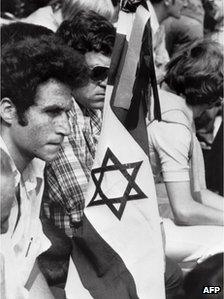Germany and Israel mark Munich massacre in ceremonies
- Published
Flowers were laid at a plaque commemorating the dead in the Olympic Village
German ministers have joined Israeli survivors of the Munich Olympics massacre at an air base near the city to mark 40 years since the event.
The audience at Fuerstenfeldbruck heard Christian and Jewish prayers, spoken against a backdrop of the faces of the victims, 11 Israelis and one German.
Wreaths were laid earlier inside the Olympic Village where Palestinian gunmen seized the athletes.
Most of the Israelis were killed by their captors at the airport.
Israeli fencer Dan Alon, who was part of the 1972 team, said he hoped such an attack could never happen again.
A petition by widows of the victims to remember the dead with a minute's silence at the opening ceremony of the London Olympics on 27 July was rejected by Jacques Rogge, head of the International Olympic Committee.
Instead, a minute's silence was observed at a ceremony headed by Mr Rogge inside London's Olympic Village.
Flags at half-mast

Israeli athletes mourned their dead the day after the massacre
German, Israeli and Bavarian flags were lowered to half-mast at the beginning of the solemn ceremony at Fuerstenfeldbruck base. Relatives of the victims lit candles in their memory.
Prayers and addresses to the audience were interspersed with singing and music, including a muted piece by a jazz orchestra, played before an audience of at least 500 people.
"That day wasn't an attack against Israel, wasn't an attack against Jews," said Charlotte Knobloch, head of Munich's Jewish community.
"It was an attack against us all. Against the Olympic idea, the vision of freedom and peace for all human beings."
Interior Minister Hans-Peter Friedrich and other German officials, including the head of the country's Olympic Committee, Thomas Bach, were present as was Israeli Deputy Prime Minister Silvan Shalom.
Among the Israelis expected to attend was the manager of the 1972 Olympic Delegation, Mr Shmuel Lalkin.
A tree was to be planted to remember the victims and an exhibition of photos depicting the massacre and its aftermath was being unveiled.
'Warnings ignored'
On 5 September 1972, eight gunmen burst into the Israeli athletes' quarters, killing two immediately and taking nine athletes and coaches hostage.
They demanded the release of more than 200 Palestinian prisoners by Israel, and took their hostages to the airport, where a rescue attempt was made by West German security forces.
During the fighting that followed, the gunmen killed their remaining nine hostages. Five of the gunmen were killed, as was one German policeman.

Esther Roth-Shachamorov lost her coach in the attack
Israeli athlete Esther Roth-Shachamorov, who lost her coach Amitzur Shapira in the attack, had been scheduled to run in the semi-finals of the 100-metre hurdles on the day after the massacre.
"Instead of running, we found ourselves in the stadium for the memorial service," she told AFP news agency at her home near Tel Aviv this week. "There we stood, crying."
The West German authorities were accused by Israel of having failed to provide adequate security at the Games, recently declassified Israeli official documents show.
German police "didn't make even a minimal effort to save human lives", former Mossad head Zvi Zamir said at the time after returning from Munich. The documents also show evidence of failures by Israeli security forces.
A recent article in German news magazine Der Spiegel, external has suggested that German officials ignored explicit warnings that a terrorist attack might take place at the Munich Games.
In a statement to mark the anniversary, UK Foreign Secretary William Hague described the attack as a "shocking act of evil" which had "betrayed everything the Olympic movement stands for".
- Published5 September 2012